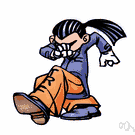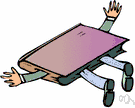trample
(redirected from trampled)Also found in: Thesaurus, Idioms.
tram·ple
(trăm′pəl)v. tram·pled, tram·pling, tram·ples
v.tr.
1. To beat down with the feet so as to crush, bruise, or destroy; tramp on.
2. To treat harshly or ruthlessly: would trample anyone who got in their way.
v.intr.
1. To tread heavily or destructively: trampling on the flowers.
2. To inflict injury as if by treading heavily: "trampling on the feelings of those about you" (Thornton Wilder).
n.
The action or sound of trampling.
[Middle English tramplen, frequentative of trampen, to tramp; see tramp.]
tram′pler n.
American Heritage® Dictionary of the English Language, Fifth Edition. Copyright © 2016 by Houghton Mifflin Harcourt Publishing Company. Published by Houghton Mifflin Harcourt Publishing Company. All rights reserved.
trample
(ˈtræmpəl)vb
1. to stamp or walk roughly (on): to trample the flowers.
2. to encroach (upon) so as to violate or hurt: to trample on someone's feelings.
n
the action or sound of trampling
[C14: frequentative of tramp; compare Middle High German trampeln]
ˈtrampler n
Collins English Dictionary – Complete and Unabridged, 12th Edition 2014 © HarperCollins Publishers 1991, 1994, 1998, 2000, 2003, 2006, 2007, 2009, 2011, 2014
tram•ple
(ˈtræm pəl)v. -pled, -pling,
n. v.i.
1. to tread or step heavily and noisily; stamp.
2. to tread heavily, roughly, or crushingly (usu. fol. by on, upon, or over).
v.t. 3. to tread heavily, roughly, or carelessly on or over; tread underfoot.
4. to domineer harshly over; crush.
5. to put out or extinguish by trampling (usu. fol. by out).
n. 6. the act or sound of trampling.
[1350–1400; Middle English tramplen to stamp; see tramp]
Random House Kernerman Webster's College Dictionary, © 2010 K Dictionaries Ltd. Copyright 2005, 1997, 1991 by Random House, Inc. All rights reserved.
trample
Past participle: trampled
Gerund: trampling
| Imperative |
|---|
| trample |
| trample |
Collins English Verb Tables © HarperCollins Publishers 2011
ThesaurusAntonymsRelated WordsSynonymsLegend:
Switch to new thesaurus
| Noun | 1. |  trample - the sound of heavy treading or stomping; "he heard the trample of many feet" trample - the sound of heavy treading or stomping; "he heard the trample of many feet"sound - the sudden occurrence of an audible event; "the sound awakened them" |
| Verb | 1. |  trample - tread or stomp heavily or roughly; "The soldiers trampled across the fields" trample - tread or stomp heavily or roughly; "The soldiers trampled across the fields"walk - use one's feet to advance; advance by steps; "Walk, don't run!"; "We walked instead of driving"; "She walks with a slight limp"; "The patient cannot walk yet"; "Walk over to the cabinet" treadle - tread over; "the brick maker treadles over clay to pick out the stones" |
| 2. |  trample - injure by trampling or as if by trampling; "The passerby was trampled by an elephant" trample - injure by trampling or as if by trampling; "The passerby was trampled by an elephant"injure - cause injuries or bodily harm to | |
| 3. |  trample - walk on and flatten; "tramp down the grass"; "trample the flowers" trample - walk on and flatten; "tramp down the grass"; "trample the flowers"walk - use one's feet to advance; advance by steps; "Walk, don't run!"; "We walked instead of driving"; "She walks with a slight limp"; "The patient cannot walk yet"; "Walk over to the cabinet" |
Based on WordNet 3.0, Farlex clipart collection. © 2003-2012 Princeton University, Farlex Inc.
trample
verb
Collins Thesaurus of the English Language – Complete and Unabridged 2nd Edition. 2002 © HarperCollins Publishers 1995, 2002
trample
verb1. To step on heavily and repeatedly so as to crush, injure, or destroy:
The American Heritage® Roget's Thesaurus. Copyright © 2013, 2014 by Houghton Mifflin Harcourt Publishing Company. Published by Houghton Mifflin Harcourt Publishing Company. All rights reserved.
Translations
يَدوس، يَدْعَس
pošlapat
eltapos
traîka á
mīdītnomīdīt
teptati
trample
[ˈtræmpl]B. VI (also to trample about, to trample along) → pisar fuerte, andar con pasos pesados
to trample on sth → pisar algo, pisotear algo
to trample on sb (fig) → tratar a algn sin miramientos
to trample on sb's feelings → herir los sentimientos de algn
to trample on sth → pisar algo, pisotear algo
to trample on sb (fig) → tratar a algn sin miramientos
to trample on sb's feelings → herir los sentimientos de algn
Collins Spanish Dictionary - Complete and Unabridged 8th Edition 2005 © William Collins Sons & Co. Ltd. 1971, 1988 © HarperCollins Publishers 1992, 1993, 1996, 1997, 2000, 2003, 2005
trample
[ˈtræmpəl] vt [+ grass, flowers] → piétiner; [+ people] → piétiner
to get trampled underfoot → se faire piétiner
to get trampled underfoot → se faire piétiner
trample on
vt [+ grass, flowers] → piétiner
(= disregard) [+ feelings, rights] → piétiner
Collins English/French Electronic Resource. © HarperCollins Publishers 2005
trample
vt → niedertrampeln, niedertreten, zertrampeln; to trample something underfoot (lit, fig) → auf etw (dat) → herumtrampeln; she tramples her husband underfoot (fig) → ihr Mann hat bei ihr nichts zu sagen (inf); he was trampled to death by a bull → er wurde von einem Bullen zu Tode getrampelt; to trample something into the ground → etw in den Boden treten or trampeln
Collins German Dictionary – Complete and Unabridged 7th Edition 2005. © William Collins Sons & Co. Ltd. 1980 © HarperCollins Publishers 1991, 1997, 1999, 2004, 2005, 2007
trample
[ˈtræmpl] vt to trample (underfoot) (crush) → calpestareto trample sth into the ground → calpestare qc
Collins Italian Dictionary 1st Edition © HarperCollins Publishers 1995
trample
(ˈtrӕmpl) verb to tread heavily (on). The horses trampled the grass (underfoot).
Kernerman English Multilingual Dictionary © 2006-2013 K Dictionaries Ltd.